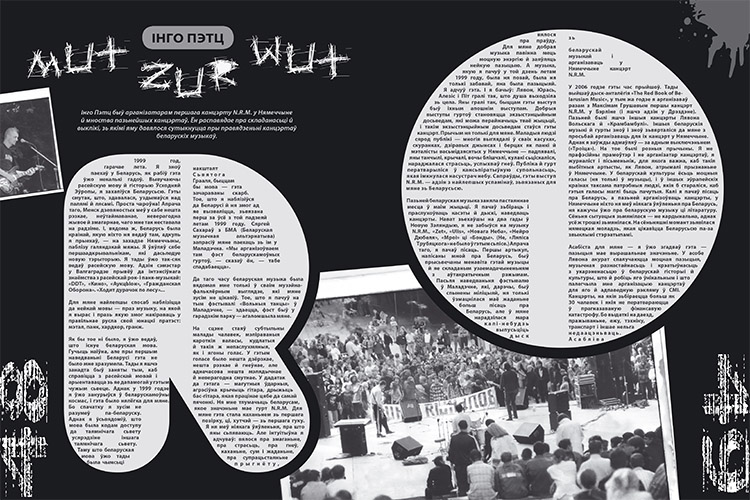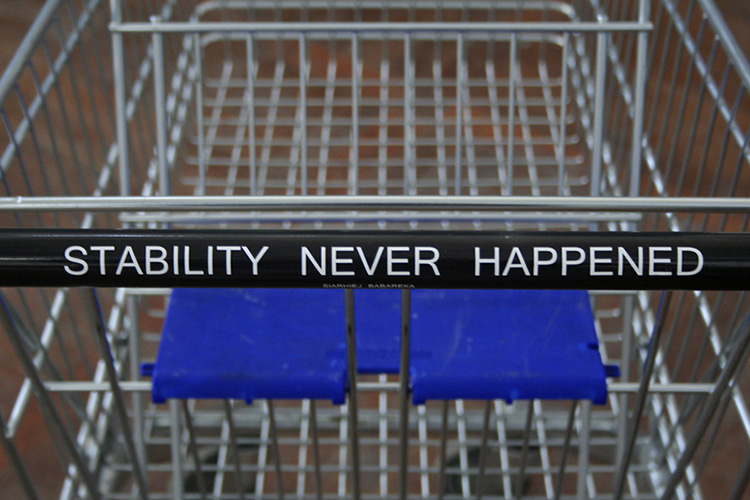
Аўтар: pARTisan, 25/03/2014 | Cult Aktivist SPECIAL
To Ruin The Schizophrenic Reality
The discussion «Independent Communities in Belarus: Solidarity and Action» took place on March, 11 in Gallery «Ў» (Minsk). The organizers are media-project «pARTisan» and internet-magazine «New Europe».
Taciana Arcimović: Good evening! The starting point for this discussion was set by a number of latest events which showed Belarussian independent communities (intellectual, cultural and academic ones) advocating the rights of individuals or organizations — victims of violence by legal authorities (cases of such artists as Vital Kałhin, Michaił Hulin, «Łohvinaŭ» publishing house, etc.) Every case had its own final. For example, artist Vital Kałhin is still recovered at a psychiatric hospital, «Łohvinaŭ» publishing house was denied a license with the way out being found in getting registered in Vilnius. Fortunately, artist Michail Hułin managed to win his court case and that is almost the only one positive example.
Due to this we would like to discuss the following questions. Acting as a community, would it be possible to achieve results? What do we need for that: new technologies, interaction skills (negotiation skills), lawyers and human rights activists help, international attention? Can we talk about the effectiveness of independent communities interventions in Belarus? How can we influence the situation and draw public attention to the existing legal (dis)order?
We have invited to take part in the discussion the following participants: historian Alaksei Brataćkin, artist Michaił Hulin, artist and writer Artur Klinaŭ, human rights activist Alena Tankaćova, philosopher Volha Śparaha. The moderator of the discussion is Taciana Arcimović.
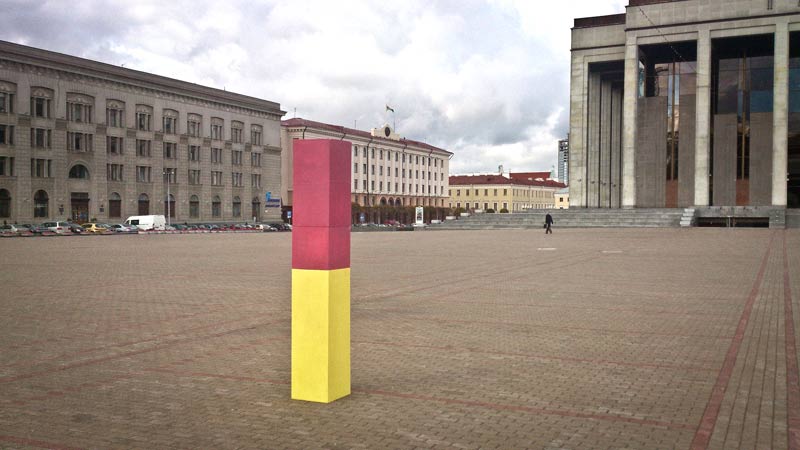
Michail Hulin / A Personal Monument / action Minsk 2012
Michail Hulin: Мy story seems to be rather an exception. I managed to win the court case, thanks to the support of independent community as well as «Lawtrend». I would also like to extend my personal thanks to Alena Tankaćova.
But I had to sacrifice a political component of my artistic expression.
In all the interviews and presentations I said that it was only bright cubes, certainly, I did not say a single word about testing space. And many people could take me for such a clown, but we really won the case, and I think that in many ways leveling political content contributed to this victory. Although, of course, as an artist, I do not appreciate this fact.
Regarding the supporting letter addressed to the Goethe Institute, I must admit that it never saw the light. Its tone was constantly changing to a milder one, so the original phrase «the public is outraged» was finally transformed into «the public is concerned» in the letter’s latest version. That is why I do not see it as success. In fact, in my opinion, there are no successful examples of such letters, so now I do not sign any petitions.
But back to the question, I really felt support and it is important that there are adequate people and one does not feel isolated.
Alaksiej Brataćkin: I would like to remind the research done by sociologist Taciana Vadałaźskaja and her colleagues — «The Ban on Profession in Belarus». They calculated that in the given period in Belarus more than 500 people were laid off (or had their activities limited) in various spheres due to their views and political actions. Speaking about humanitarian sphere and science, the number of such people is also fairly big. This tendency determined an incentive to create a certain community that would be able to react to such cases. Here is one of the examples: in 2007 Nina Struzhynskaya made an attempt to found the Association of Free Belarussian Historians (not long before the staff was purged at the Institute of History: Hienadz Sahanović was fired, as well as Struzhynskaya and others). The Association was registered, but definite outcomes were not reached.
Apart from firing people there are other attempts of exerting influence. For example, postponing the terms of dissertations defense or dissertations being denied in defense through a combination of various beurocratic mechanisms. Michail said that he had to remove the political aspect out of his statement in order to protect himself.
But state authorities also remove this aspect when they ground the reasons why they fire people. Since no one can speak openly about it. Everything occurs at the level: «well, you do understand everything yourselves».
One of the latest cases is the events at Hrodna University when several professors were dismissed due to different reasons including the publication of the book «Hrodna Studies». Mass media claimed that the authors of the book were fired because all the events presented in the book finished in 1991, that is nothing was said about the period which followed. But those professors were dismissed again for bureaucratic reasons — the way they were presenting themselves at work, for example. And everything seems to be clear, the algorithm itself is understandable, but in fact it is not.
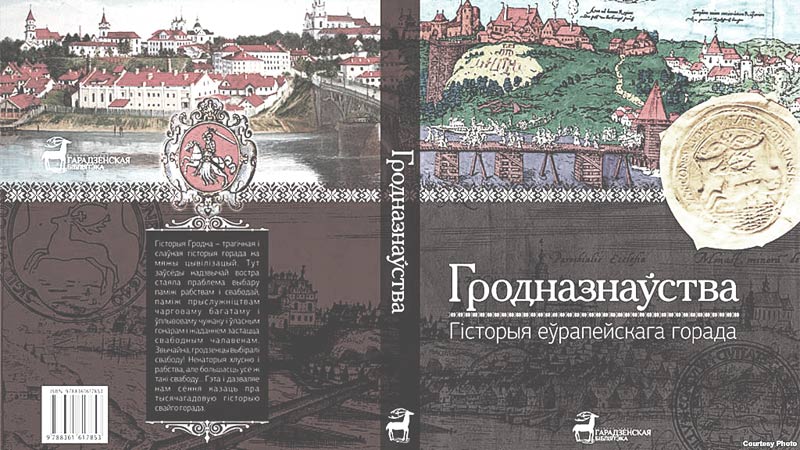
A cover of «Hrodna Studies»
Can we say that the relations between historians (or other humanitarians) and the state are differently structured in Minsk or in Hrodna? In both the cities there are cases of people’s dismissal but through which mechanisms are they done? There is little information about it, we have no monitoring of these cases. How does this system function? What are the Labour Code tricky articles the states makes use of? It seems to me that this should be given attention to.
Certainly, now we know much more about all these cases in humanitarian field, because there is such a community as facebook which has been transformed into a «quasi-public» sphere, where our public life evolves. The information spreads fast. That is, I repeat, monitoring of such individual cases is needed.
Since we realize that such an ideological background is present, but we do not see how it can work in the rest of the country, at particular universities.
As for the positive sides, I thought it was not the Soviet situation, in the Soviet era people were expelled from the party, they were dismissed and even their destinies could have quite a tragic end. And here a tragedy is more likely to characterize those institutions which people leave. But, of course, on condition that alternative institutions exist. For example, the dismissal of a number of historians significantly enhanced the scope of independent research. On the one hand, technologies are meant, but on the other hand, at a larger scale, this problem can be solved by the creation of some kind of institutional support in Belarus and abroad.
Alena Tankaćova: Developing a few points that have already been brought forward by my colleagues, I would like to highlight the following. If we start comparing the situations, it depends on what one compares. We do not find ourselves in a situation of danger, as many of our Belarusian colleagues do.
For example, human rights activist Ales Bialacki is still in prison.
There are other political prisoners who got imprisoned for doing the same thing — only for stating their own point in different areas, for being consistent in their actions. I understand that for someone the dismissal itself, being deprived of teaching opportunity, is already a big drama, because people might have been thinking all their lives that it was their place, and suddenly their normal lives get ruined. But again, the degree of invasion is different here.
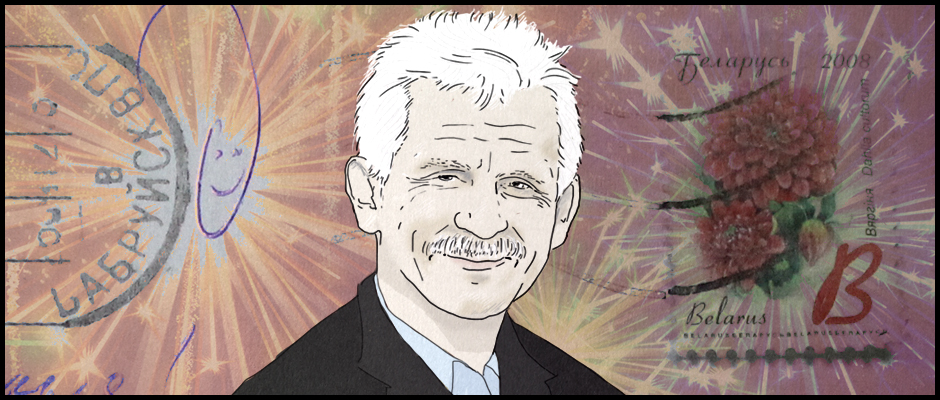
Ales Bialacki who is still in prison // photo: 34mag.net
In Hulin’s court case nothing had to be cut out from his political message, because the court itself was a game. It was also a sort of performance, but it happened solely because Hulin and his friends were ready to go to the end. And it is exactly this standpoint — to be ready to go to the end — that we lack. Yes, we won the case, we could provide Michail with lawyers, demanded a video recording. But not this played a key role, we could have lost doing all these things. There are many other examples where there were witnesses, facts and the law, but the case was lost.
Because in an authoritarian state the law does not function the way it should. And you should not have illusions about it.
Of course, the legal mechanisms must be used, primarily due to one’s self-esteem, but not because of the illusion that thanks to this law you can reach justice. Courts in an authoritarian system are a part of the system.
Now a few words about petitions. Before the world, including law-enforcement one, faced new authoritarian systems, this mechanism had been clear. When somewhere in the world something terrible occurred, organizations, for example Amnesty International, started writing letters, collecting signatures, and it was a normal practice of law enforcement. People demonstrated solidarity and a person was said that the case was known throughout the world, and if he/she joined, there would be a certain reaction. That is one type of petition, but it no longer works as it should. Of course, you can think that a large number of signatures collected worldwide in defense of a certain person played its role. But honestly speaking, except for one person who has ceased to be afraid to sign the paper and really signed it, petitions do not have a major impact.
But should one sign then? Yes, no doubt, but you need to understand rather well that this does not influence at all the final result.
It is also important to realize that the petition has value when its addressee is obliged to respond to it. Unless we sign it with a clearly defined addressee, it would not work. Of course, our collective energy might affect something, but certainly not that subject, who should make the ultimate decision. So, the question remains: should we sign petitions then? Yes, for ourselves and perhaps in order to feel that we are a community, at least virtually.
Volha Śparaha: I have no answers to the questions, I would rather pose new ones. As it was said in the beginning, the starting point for this discussion and in general for this project was set by the fact that we did not discuss Michail Hulin’s case as well as other cases, we did not make conclusions, did not reflect on what had helped and what had been done wrong.
And probably one of the goals of any community is to monitor such situations, to discuss them and to build the basis for further actions.
In this regard, it seems to me that in Belarus we have a situation when communities arise «after» not «before» something happens. I faced this fact at EHU, when crisis burst out and we realized that we still needed to create a solidary — not just scientific — community: people have different goals, tasks, ideas about what and how should be done. Thus, as a humanitarian, I arrive at the conclusion that we, humanitarians, really discuss little, and this fact creates the whole set of problems — problems of violence, of difference in communities values, problems of trust, solidarity, etc. Can we interact easily? Are there any things which fundamentally divide us? Where is that threshold between giving in and defending one’s position? It seems to me that these questions should also be discussed jointly.
We need to move from the strategy of an «after»-community to the strategy of «before» and in order to do this we need all the things we have already mentioned — new technologies, interaction skills, lawyers help and international attention.
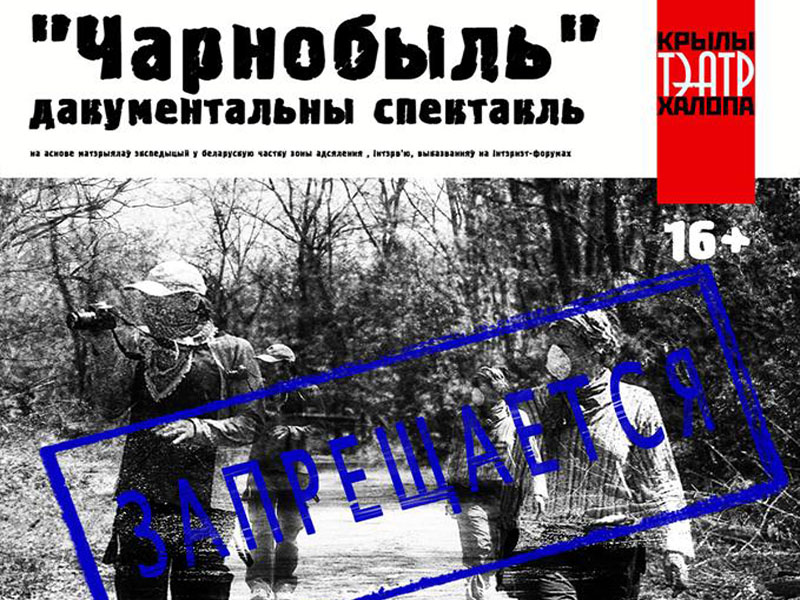
The performance ‘Ćarnobyl’ by Brest independent theatre ‘Kryly Chałopa’ was abonded by city’s authority
As for petitions, that is true, we are tired of them, but, on the whole, we can invent new formats. But to do it in a more effective way, the actions must be joint. And not only at a critical moment, but «before» all these things are discussed. The question of international community. We refer to it only at a critical moment, but before this moment comes — how intensively do we interact with our foreign partners, to what extend are we open to others, are we interested in their problems? That is, we need to be sensitive to the international context, not only in emergency cases.
And finally, something with which I started: society should be a subject-matter.
I would like very much humanitarians to deal more with this topic, with its various aspects. And not only humanitarians. It seems to me, in an artistic scope through artistic means and cultural projects, we can solve many questions. There are also other languages that can problematize political, social, cultural contexts, talk about trust, solidarity, violence. It is not necessarily talking about political prisoners, but they will be in the horizon, when we talk about daily violence, for example.
Certainly, we cannot close our eyes, we need to think about the space where we can talk about it and these spaces might also interact with one another. On the one hand, we talk about daily violence, but we make a reference to the site dedicated to Ales Bialiacki, or mention that there are other forms of violence. But then again, what forms of cultural and artistic projects should there be — this is also something we have to think together, helping each other.
Artur Klinaŭ: I would like to give the problem of communities and communication a different look — through the ontological nature of the Belarussian person. And here the problem can really be observed, so to speak, about the obstacles for self-organization of the Belarusian communities. Because the Belarusian people are largely people of the underground, or «partisans». «Underground man» and «partisan» are concepts which are very close to each other.
A Belarusian partisan lives in every Belarussian, but he/she, as you know, was not formed by this power, not even the Soviet one, but many more centuries before. «Partisan» is a survival formula under the conditions of occupation. Whereas surviving under occupation is always an individual program, partisans do not form a collective action figure. Any collective action under occupation is dangerous for survival. It is so deeply embedded at the genetic and mental levels that for the Belarusians it is very difficult to make a collective action, it is difficult to get united with someone.
We are the nation of extreme individualists. And here it rather has a negative meaning.
Let us take the sphere of culture, for instance. Communication between different spheres of culture has been very weak for a long time. That is, each community was living in its own world and almost never encountered others. Artists did not really know what was going on in the theater, or in literature. Even within a single field, for example in art, there was no dialogue. And one of the reasons for this atomization is just, in my opinion, the ontological essence of the underground man which is rooted in every of us. To overcome it — that is where our problem and the most important task is. Because the partisan formula had been effective for several centuries, it gave people a chance to survive, or to ensured them with self-protection. But time passed and now it has become an hindrance: the occupation is gone, but the underground man remained inside.
And to get rid of this underground man is our task now.
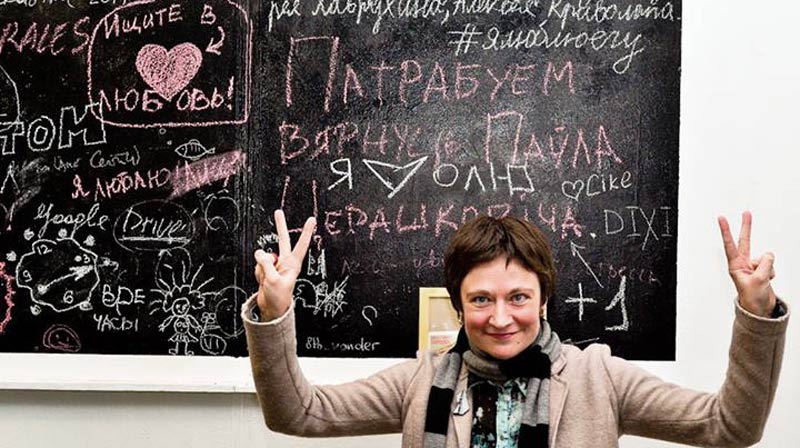
Volha Śparaha with a banner for advocacy of Pavał Cieraśković
But changes do occur. Watching the situation of the last decade, I see the process evolving, it happens slowly, but it does happen. Stimuli for this process may be different. Those new technologies, for example the same facebook, where now there is a sort of virtual partisan movement: if you are on the front lines, but at the same time you feel safe. Underground man goes into virtuality and commits intellectual diversion, feeling totally secure. Unconsciously he/she begins to communicate with other partisans, begins exchanging information, discussing, setting up intelligent shooting, but in any case it is already a certain communication between the atomized actors of the Belarusian society. Let this virtual contact be first, but then it can turn into something else.
The process goes on, and this is only the beginning. I see a future breakthrough in the eradication of the underground man. Partisan must become an art-activist. But it will not happen fast. How can this process be speeded up? That is the question.
А.B.: This is a controversial statement, because, for example, I do not find such an underground man in myself. I have thought about the structural mechanisms of state institutions. First of all, there are certain mechanisms by which we are deprived of our rights. For example, the contract system is completely isolated from professional competition. It does not matter whether you pass the competition or not, even if your colleagues from the department vote for you. But the fact is that a contract might not be signed with you, and thus your professionalism values little.
Secondly, trade unions do not work at all. In this sense, a person really remains alone, as a partisan under occupation. This is an interesting point of interaction in the environment. The way it is formed, in the absence of legal mechanisms, when you are supposed to rely not on human feelings, but on some other things. And how it can be changed, in my opinion, is a more interesting issue than the issue about changing the essence .
А.К.: I would like to add that the authorities also act like partisans. They do not say openly about the reasons of one’s dismissal, but invent some sort of excuses — for instance, «there seems to be something wrong»! Or maybe there are black lists, which no one has ever seen. So, this is also a partisan strategy, its other side.
А.B.: Maybe this is just what we need — to ruin the schizophrenic reality. To trace these moments of concerts bans, for example. An interview with Valery Bulgakov comes to mind, when he said that we should give an asymmetric response to the authorities actions. I do not know how, but the idea is very good, I wish there were enough imagination for anything else.
In reality we usually react as a mirror, as if repeating the state.
А.Т.: Something similar seems to be happening at the moment. For example, this discussion is a argument to prove that. I mean that the representatives of various communities are present here. 3-5 years ago I knew nothing about, for example, the Historians Association. I had enough of my own professional environment. And this is such an asymmetrical response in the interdisciplinary strong communication, in this mutual enrichment of goals, objectives, methods with a clear common task. In order not to become a part of this schizophrenia.
Since while we stay each by oneself, within one’s professional community, we are unable to resist the system.
Minsk, March 2014. Translated briefly from Belarusian by Volha Bubić.
Opinions of authors do not always reflect the views of pARTisan. If you note any errors, please contact us right away.




